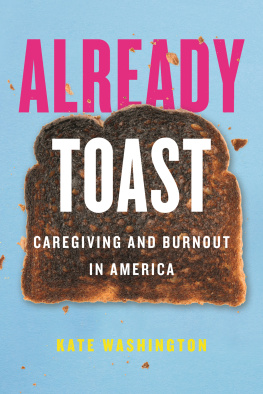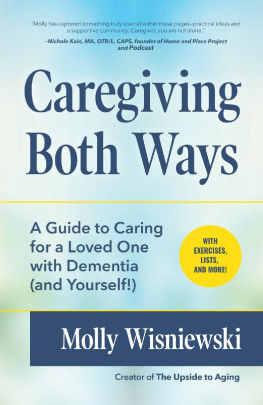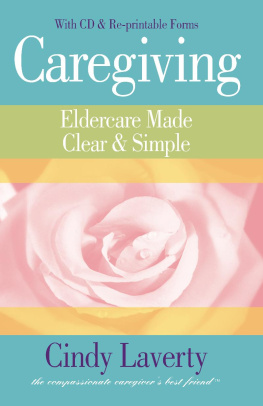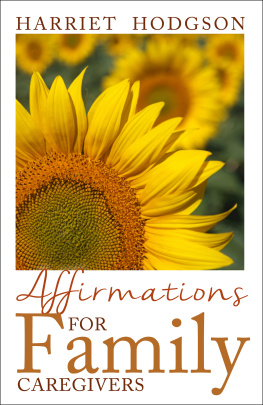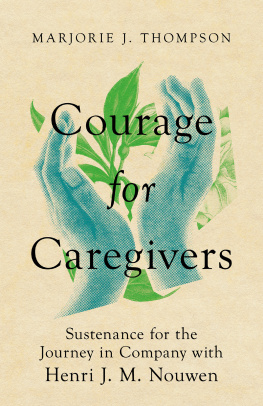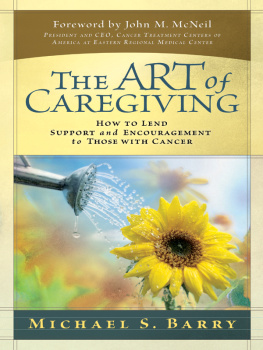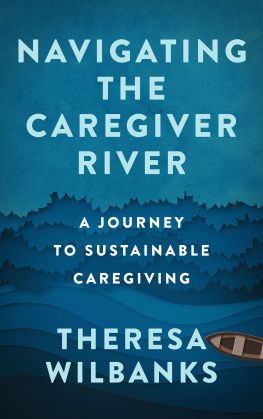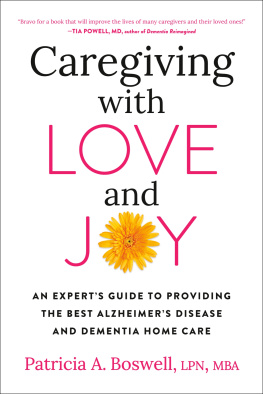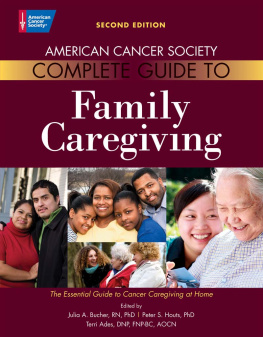Contents
Guide
Pagebreaks of the print version

For my daughters, in hopes that our society will be more equitable and caring when they are grown up, and for all the caregivers out there getting through the hard times
INTRODUCTION
COLLATERAL DAMAGE
I n despair, I typed caregiver into Google, planning to follow it up with resources or support group. The first search the autofill suggested, however, was caregiver burnout. I sighed and clicked. That morning, Id cried my way through a miserable appointment with my husband Brads oncologist. The news wed received had been no grimmer than any other development over the preceding eighteen months of his treatment for a rare T-cell lymphoma, which had included a debilitating stem cell transplant. But on that hot July day in 2016, I was so exhausted by the caring grind that I could no longer cope. To my embarrassment, I couldnt stop weeping or even look up. Id always tried to project competence with Brads physicians so they would take my questions seriously, but by 10 a.m. I was already worn out. Id spent the morning packing lunches, running our kids to summer camp, loading a heavy wheelchair into the car, wheeling my frail husband across hot asphalt, and picking up a dozen new meds from the Cancer Center pharmacy, all on not enough sleep and with the knowledge that bills, laundry, and plenty else were waiting for me at home. My good-caregiver mask dropped. Tears fell on the coral-colored jersey dress Id worn to try to present myself as capable rather than a frazzled disaster. As I broke down, the oncologist chided me for not taking good enough care of myself. If I didnt, he said, how could I take care of my husband?
Fragile and overextended, I heard in that question an implication that the only point of me, as a human and not coincidentally as a woman, was to care for another person. What about my own life? Didnt I deserve care in my own right? I left the office as silently as Id sat in it, but fuming now instead of crying. The so-called self-care that the oncologist had prescribed felt like yet another task I resented, yet another obligation I had to fulfill. What I wanted was for somebody else to volunteer to care for me. Still, I dutifully went home and Googled, intending to look for resources.
The top result for caregiver burnout was a quiz to determine whether the caregiver taking it was burned out. I took it. At the end I got the breezy result Youre already toast! illustrated with a stock photo of a charred piece of bread. The website recommended taking more time for myself, getting a massage or going on walks, arranging for care so I could have an hour to myself, or even an occasional night away. But it said nothing about what to do if I was already doing those things and was burned out anyway.
At first I wasnt particularly bothered by the quizs cheerful assertion that I was already toast. Toast is the food of invalids, and the food of comfort. The food I turn to when I am sick, when I am sad, when someone I love is either of those things. Cut into strips, soaked in butter, unchallenging, warm, browned, delicious thanks to the Maillard reaction. Why is it also a negative word? Why youre toast? Toasting usually makes things better; burning makes them worse. But this quiz result was clearly negative: Youre done. Crisped. Eaten. Chewed up. Swallowed. Sounded about right.
I spent more than two years as Brads primary caregiver during the long, intense crisis phase of his illness; in the years since, as hes endured disability and chronic illness, my responsibilities have ebbed and flowed depending on his health. During the long crisis, I was so overwhelmed, and eventually so burned out, that sometimes I fantasized about simply turning around while driving to the pharmacy or the grocery store, heading to the airport instead, and buying a ticket on any plane going somewhere semitropical. I was forty-two when Brad was diagnosed, and I joked to friends that I was having a very inconvenient midlife crisis, but under the dark humor lay a lot of truth. What stopped me from abandoning my life was the thought of the fallout: Likely endangering my husbands life. Shocking our friends. Further traumatizing our already fragile children. Inducing lifelong guilt by becoming a person who left her husband at his lowest point. Alienating everyone Ive ever loved, everyone who has ever loved me.
I stayed. Brad is no longer desperately ill, but he was permanently disabled by the aftereffects of his treatment. Weve worked hard, often painfully, to rebuild our marriage and our lives. Its still a work in progress. In the long ordeal of his illness, his survival was the focus. If cancer is often described as a battlea metaphor I dislike, since its hardly a fair fightI feel like my life was collateral damage.
This book is the story of that toll and of how heavily the weight of caregiving can fall, especially on women. Nobodys caregiving experience will look quite like mine, and this book isnt a traditional how-to resource, but I hope it can prepare people emotionally for the challenges of caregiving or offer solace in the thick of it. Our culture undervalues caring and exploits those who care for othersshunting these tasks disproportionately onto women, people of color, and other marginalized groups, often paying them no more than minimum wage for their efforts. And society often frames family caregiving as both priceless and worthless, as Evelyn Nakano Glenn puts it in her 2010 book Forced to Care. In other words, sentimentalized narratives around caregiving may tell us the work we do is an invaluable gift that is its own reward, as in the very title of the recent book Priceless Caregiving: Stories of Elder Care Success, Courage, and Strength. Yet the work of most family caregivers receives little financial support and so lacks economic worth: most family caregivers are never paid, and indeed most take a profound financial hit due to a lack of societal support or of adequate work leave for their role. In truth, however, the work we do has extraordinary economic and social value. Rethinking caring labor in all of its forms, and compensating that labor adequately, is a major issue for contemporary feminism and social justiceone that the coronavirus pandemic laid particularly bare.
This book seeks to bring to light the often hidden phenomenon of caregiving: its invisibility, how American healthcare takes it for granted, how sexism and racism both can drive the assumptions we make about it, how quickly caregivers can burn out, and how urgently we need to change those patterns if we are to build the compassionate, truly caring society that both patients and caregivers deserve.
THE CONSTELLATION OF CARE
Tending to others is at the root of being human. As Arthur Kleinman notes in The Soul of Carehis lovely, nuanced portrait of tending to his wifecare is centered in relationships. So whats the problem with caregiving? In cases of serious illness or ongoing disability, the work of a family caregiver can expand with alarming speed to become a full-time job that includes paperwork and fighting insurance battles, administering IV nutrition and changing colostomy bags, sorting medications and checking insulin.
As a caregiver, I sometimes felt like I barely existed as an individual. One day I had to pick up a prescription for myself and when the pharmacist asked my date of birth, I unthinkingly gave my husbands. I had become so used to providing his birth date that when it was time to meet my own medical needs, I forgot the most basic fact about myself. It was a momentary slip but also a profound moment of erasure. The medication I was picking up was an antidepressant Id started taking to cope with the anxiety and hopelessness I felt because of someone elses illness. The writer Anne Boyer, in her lyrical memoir of her breast cancer ordeal,

